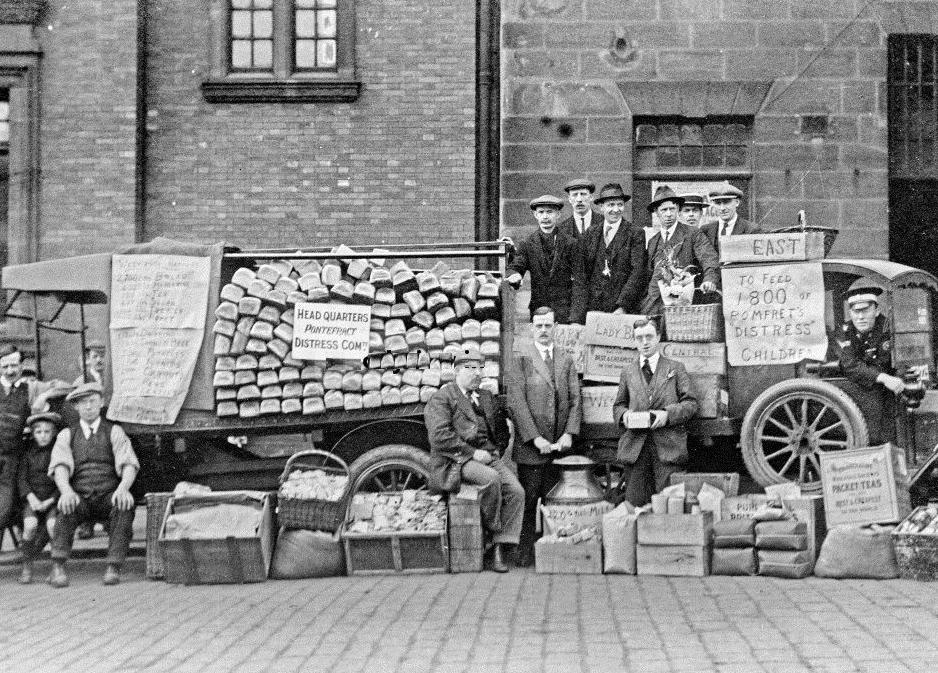
World War I: British Economic Consequences

Figure 1.--Here we see food collected for distressed Children during the Depression of 1920-21. The photograph was taken in Pontefract, Yorkshire. We do not have any further information on this relief effort, but it seems to be the work of a local committee. The sign that we can reads says that they were going to feed 800 children.
|
|
World War I was not, as widely expected in Britain, over by Christmas 1914. Some like Lord Grey, British Foreign Secretary, had a more realistic idea as to what was happening. He told a friend, "The lamps are going out all over Europe, we shall not see them lit again in our life-time." He proved to be more perceptive than he had imagined. World War I proved to be up to the time the most destructive war in human history. It could be have been no different if the allies were to prevail. Germany had the most powerful army in Europe and was well armed because of Germany's a formidavle industrial base well armed and trained. The allies were not going to defeat that army in the field. The only was to defeat the Germans was for the Allies to take advantage a of their superior resources, meaning a protracted, costly war of attrition. Thus the British created a war economy and eventually instituted conscription for the first time. The primary problem faced by Prime Minister Lloyd George after the Armistice was how to transition the British war economy to peace time and how to make sure the demobilized servicemen found jobs. And that process was imeded by the post-War Depression (1920-21). The causes were manifold, one economists focuses on demand. [Vernon] Factories operating on military contracts had to retool and find new buyers. This meant temporary reductions in employment. Other factors may have been involved including labor unions, monetary policy, deflationary expectations, and other problems. This was part of a wider world-wide Depression which also affected the United States. Declining agricultural exporys was a factor in America, but the resulting deprssion in America impacted Britain. In addition American war loans ended. The United States helped to finance the Brirish war effort, some $4 billion from the U.S. Treaury (1917-18)--an enormous sum at the time. After the War, these loans stopped. Demobilization and the post-War Depression were just the most immediate problem. The War proved to be prolonged, deadly, and hugely expensive. Britain fielded its first conscript army. The British suffered 2.1 million casualties, including 0.7 million men killed. This was a massive loss in human terms, but it also involved substantial economic losses, both the loss of men in the prime of life and the cost of medical care and the support of those no longer to care for theselves and their families. One assessment is the destruction of 4 percent of Britain's human capital. Some countries had ligher losses, but it was still a major impact. And that was only the beginning of the economic costs. To finance the War, Britain had to liquidate an estimated 10 percent of its domestic and 25 percent its overseas assets. During the more than 4 years of the war, Britain spent someyhing like 25 of its GDP annully on the war effort. [Broadberry and Harrison]. The economic losses impaired Britain's ability to deal with needs of its veterans and citizens. One ongoing problem was markets lost during the War as foreign consumers rurned to american prducts. The Japanese also benefitted. This was not a problem solved by the end of the War.
Sources
Broadberry, S and M. Harrison. M. “The Economics of World War I: an Overview”, in S. Broadberry and M. Harrison (eds.), pp. 3-40 in The Economics of World War I. (Cambridge: Cambridge University Press, 2005).
Vernon, J. R. "The 1920-21 Deflation: The Role of Aggregate Supply". Economic Inquiry Western Economic Association International (July 1991) Vol. 29, No. 3, pp. 572–80.
CIH -- WW I

Navigate the CIH World War I Section:
[Return to Main British World War I page]
[About Us]
[Aftermath]
[Alliances]
[Animals]
[Armistace]
[Biographies]
[Causes]
[Campaigns]
[Casualties]
[Children]
[Countries]
[Declaration of war]
[Deciding factors]
-------[Diplomacy]
[Economics]
-------[Geo-political crisis]
[Home front]
[Intelligence]
[Military forces]
[Neutrality]
[Pacifism]
[People]
[Peace treaties]
[Propaganda]
[POWs]
[Russian Revolution]
[Terrorism]
[Trench warfare]
------[Technology]
[Weaponry]
[Bibliographies]
[Contributions]
[FAQs]
[Images]
[Links]
[Registration]
[Tools]
[Return to Main World War I page]
[Return to Main war essay page]
[Return to CIH Home page]
Created: 6:57 AM 1/25/2017
Last updated: 6:57 AM 1/25/2017



